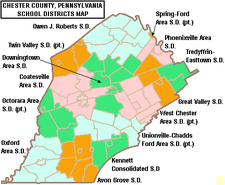Church Farm School
This article needs additional citations for verification. (December 2012) |
| Church Farm School | |
|---|---|
 | |
| Address | |
 | |
1001 East Lincoln Highway , 19341-2818 United States | |
| Information | |
| School type | Independent boarding & day high school |
| Religious affiliation(s) | Christianity |
| Denomination | Episcopal[1] |
| Established | 1918 |
| Founder | Charles Shreiner |
| NCES School ID | A1903685[1] |
| Headmaster | Edmund K. Sherrill II |
| Faculty | 26.3 (on an FTE basis)[1] |
| Grades | 9–12[1] |
| Gender | All-male[1] |
| Enrollment | 171[1] (2019-2020) |
| • Grade 9 | 39[1] |
| • Grade 10 | 44[1] |
| • Grade 11 | 43[1] |
| • Grade 12 | 45[1] |
| Average class size | 12 |
| Student to teacher ratio | 1:6.5[1] |
| Hours in school day | 7[1] |
| Campus size | 250 acres (100 ha) |
| Campus type | Suburban |
| Color(s) | Maroon and Grey |
| Athletics conference | PIAA District 1, Bicentennial Athletic League |
| Nickname | Griffins |
| Accreditations | NAES, NAIS, TABS |
| Newspaper | Greystock News |
| Yearbook | CFS Griffin |
| Endowment | $120-150 Million |
| Annual tuition | $48,000[2] |
| Website | www |
The Church Farm School (CFS) is a private secondary Christian school in Exton, Pennsylvania, United States.[4][5] In 1985, the campus was listed as a historic district by the National Register of Historic Places.
History
[edit]The school was founded in 1918 by Charles Shreiner. Shreiner, an Episcopal clergyman, established the school in Glen Loch (now Exton) Pennsylvania, on Route 30 (Lincoln Highway), as a boarding school for boys from single-parent homes, primarily those without fathers. The sons of the clergy, members of the armed services, and police officers were a second focus of the school in its early days. Shreiner, because of his strict belief in the importance of discipline and a strong work ethic, was known to the boys as the "Colonel."[6]
Shortly after its founding, the school acquired the Benjamin Pennypacker House property.[7] The school integrated in 1963. After Shreiner died in 1964, the Board of Directors placed the school under the direction of his son, Charles Shreiner, Jr., a World War II veteran who served until retirement in 1987. The school's third headmaster, Charles "Terry" Shreiner, III, the founder's grandson, led the school from 1987 and retired in 2009. Interim headmaster, Thomas Rodd, Jr., led the school before Edmund K. Sherrill II, an Episcopal clergyman, became headmaster in July 2009.
Over the first half of its history, the school's campus grew to 1700 acres, on which it operated a large farm with student labor. Each boy was required to work half of each school day and full-time for half of each summer. This enterprise included a large dairy farm and hog raising operation and produced many crops. The school gradually phased out agricultural activities, beginning in the mid-1970s, selling off most of the remaining farmland to developers by the late 1990s. The dairy barns and silos remain as a memorial of the agricultural era of the school's history.
Notable alumni
[edit]- Jon Bradshaw, journalist
- Micheal Eric, Nigerian basketball player
- Jón Axel Guðmundsson, Icelandic basketball player
References
[edit]- ^ a b c d e f g h i j k l "Search for Private Schools – School Detail for Church Farm School". National Center for Education Statistics. Institute of Education Sciences. Retrieved September 25, 2022.
- ^ "Tuition and Financial Aid". Admission. Church Farm School. 2022–2023. Retrieved September 26, 2022.
- ^ "National Register Information System". National Register of Historic Places. National Park Service. March 13, 2009.
- ^ "2010 CENSUS - CENSUS BLOCK MAP: Exton CDP, PA." U.S. Census Bureau. Retrieved on October 9, 2018. "West Chester Area Council of Governments Map Archived September 26, 2018, at the Wayback Machine." On the website of West Goshen Township. Retrieved on September 26, 2018. This shows the boundaries of West Whiteland Township.
- ^ Home Archived 2018-11-13 at the Wayback Machine. Church Farm School. Retrieved on October 9, 2018. "Church Farm School | 1001 E. Lincoln Hwy. | Exton, Pennsylvania 19341"
- ^ Diane Snyder and Martha Wolf, 1984, NRHP Nomination Form for the School at Church Farm Enter "public" for ID and "public" for the password to access the site.
- ^ "National Historic Landmarks & National Register of Historic Places in Pennsylvania" (Searchable database). ARCH: Pennsylvania's Historic Architecture & Archaeology. Retrieved November 2, 2012. Note: This includes M. L. Wolf and Brandywine Cons. (December 1981). "Pennsylvania Historic Resource Survey Form: Benjamin Pennypacker House" (PDF). Retrieved November 5, 2012.
External links
[edit]- Christian schools in Pennsylvania
- Private high schools in Pennsylvania
- Boarding schools in Pennsylvania
- Preparatory schools in Pennsylvania
- Nondenominational Christian schools in the United States
- Educational institutions established in 1918
- Schools in Chester County, Pennsylvania
- School buildings on the National Register of Historic Places in Pennsylvania
- Tudor Revival architecture in Pennsylvania
- School buildings completed in 1918
- Private middle schools in Pennsylvania
- 1918 establishments in Pennsylvania
- Episcopal schools in the United States
- Boys' schools in the United States
- Historic districts on the National Register of Historic Places in Pennsylvania
- National Register of Historic Places in Chester County, Pennsylvania



